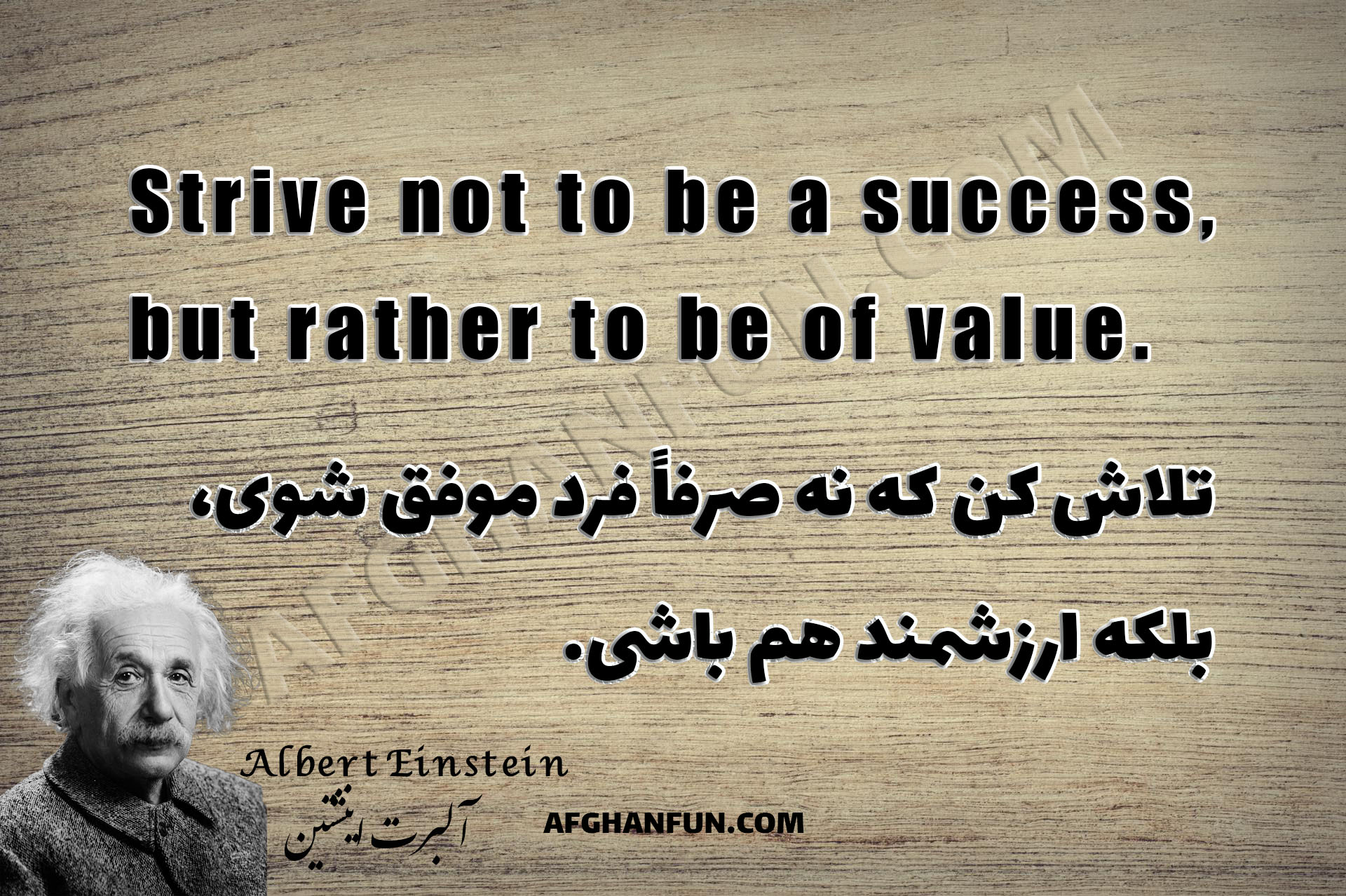Strive not to be a success, but rather to be of value.
Albert Einstein
تلاش کن که نه صرفاً فرد موفق شوی، بلکه ارزشمند هم باشی.
آلبرت اینشتین
این نقل قول تأکید دارد که موفقیت واقعی فقط در رسیدن به اهداف شخصی یا مالی خلاصه نمیشود، بلکه در ارزشی است که برای دیگران و جامعه ایجاد میکنیم. کسی که تنها به دنبال موفقیت باشد، شاید به دستاوردهای مادی برسد، اما اگر در کنار آن برای دیگران نیز مفید باشد و ارزشی بیافریند، ماندگار و الهامبخش خواهد شد. ارزشمند بودن یعنی کمک کردن، تأثیر مثبت گذاشتن، و داشتن معنایی فراتر از موفقیت فردی.
Кӯшиш кун, ки на танҳо шахси муваффақ бошӣ, балки арзишманд низ.
Алберт Эйнштейн
Ин иқтибос таъкид мекунад, ки муваффақияти ҳақиқӣ на танҳо дар расидан ба ҳадафҳои шахсӣ ё моддӣ аст, балки дар арзише мебошад, ки барои дигарон ва ҷомеа эҷод мекунем. Шахсе, ки танҳо ба муваффақият майл дорад, шояд ба дастовардҳои моддӣ ноил гардад, вале агар ҳамзамон барои дигарон низ муфид бошад ва арзиш биофаринад, вай боқӣ мемонад ва илҳомбахш хоҳад шуд. Арзишманд будан маънои кӯмак кардан, таъсири мусбӣ гузоштан ва доштани маъное фаротар аз муваффақияти шахсиро дорад.
لا تسعى لتكن ناجحا فقط وإنما لتكون ذا قيمة.
ألبرت أينشتاين
هذا الاقتباس يؤكد أن النجاح الحقيقي لا يكمن فقط في تحقيق الأهداف الشخصية أو المادية، بل في القيمة التي نقدمها للآخرين والمجتمع. الشخص الذي يسعى فقط للنجاح قد يحقق إنجازات مادية، ولكن إذا كان مفيدًا للآخرين وأضفى قيمة إلى حياتهم، فسيكون مؤثرًا ومستدامًا. أن تكون ذا قيمة يعني أن تساعد الآخرين، وتترك أثرًا إيجابيًا، وأن يكون لك معنى أعمق من مجرد تحقيق النجاحات الفردية.
Let’s analyze the quote: “Strive not to be a success, but rather to be of value.” – Albert Einstein
This quote, often attributed to Albert Einstein (though its precise origin is debated), offers a powerful redefinition of success. It encourages a shift in focus from the outcomes we typically associate with success (fame, wealth, status) to the process of creating value for others. Here’s a breakdown of its key components and implications:
- “Strive not to be a success…”: This opening directly challenges the conventional understanding of success as a primary goal. It suggests that directly pursuing success might be a misguided approach. It implies that focusing solely on achieving external markers of success can be a hollow pursuit.
- “…but rather to be of value.”: This is the core of the quote and offers an alternative, more profound objective. “Value” in this context likely refers to the positive impact we have on the world and the people around us. It encompasses contributions that improve lives, solve problems, offer support, inspire, or educate.
Key Themes and Interpretations:
- Intrinsic vs. Extrinsic Motivation: The quote highlights the difference between intrinsic and extrinsic motivation. Striving for success often relies on extrinsic motivators (external rewards), while striving to be of value is rooted in intrinsic motivation (a desire to contribute and make a difference). Intrinsic motivation is generally considered more sustainable and fulfilling.
- Focus on Contribution: It emphasizes the importance of focusing outward, on what we can give rather than what we can get. By prioritizing value creation, we shift our attention from self-centered ambitions to the needs of others.
- Success as a Byproduct: The quote subtly suggests that true success is often a consequence of creating value. When we focus on making a meaningful contribution, recognition and other forms of success may naturally follow. However, these should not be the primary driving force.
- Long-Term Fulfillment: The quote implies that a life dedicated to creating value is more likely to lead to long-term fulfillment and a sense of purpose than a life focused solely on achieving conventional success.
- Humility and Service: There’s an element of humility in the quote. It encourages us to approach life with a mindset of service, recognizing that our value comes from what we offer to the world.
Relevance and Application:
This quote remains relevant across various aspects of life, including:
- Career: It encourages us to choose careers and roles where we can make a real difference, rather than simply pursuing high salaries or prestigious titles.
- Relationships: It reminds us to focus on being supportive, loving, and helpful to the people in our lives.
- Personal Growth: It suggests that personal development should be geared towards becoming a more valuable member of society, rather than simply achieving personal accolades.
In conclusion, the quote “Strive not to be a success, but rather to be of value” offers a profound and timeless message. It encourages us to redefine success in terms of contribution and impact, suggesting that true fulfillment lies in making a positive difference in the world. It’s a call to action to focus on giving rather than receiving, and to prioritize value creation over the pursuit of external validation.
Albert Einstein was a German-born theoretical physicist who developed the theory of relativity, one of the two pillars of modern physics (alongside quantum mechanics). His work is also known for its influence on the philosophy of science. He is widely regarded as the most influential physicist of the 20th century.
Einstein’s intellectual achievements and originality have made the word “Einstein” synonymous with “genius”. In 1999, he was named Person of the Century by Time magazine.
Early Life and Education
Albert Einstein was born in Ulm, Germany, on March 14, 1879. His parents were Hermann Einstein, a salesman and engineer, and Pauline Koch. Einstein had a difficult time in school, and he eventually dropped out. He later said that he felt alienated by the rigid teaching methods of the time.
In 1895, Einstein moved to Switzerland to attend the Swiss Federal Polytechnic School in Zurich. He graduated in 1900 and became a Swiss citizen in 1901.
Career
After graduating from the Polytechnic School, Einstein worked as a patent clerk in Bern, Switzerland. In 1905, he published four groundbreaking papers in the Annalen der Physik (Annals of Physics), a leading German physics journal. These papers covered the photoelectric effect, Brownian motion, special relativity, and E=mc².
Einstein’s work on relativity revolutionized our understanding of space and time. He showed that space and time are not absolute, but rather are relative to the observer. He also showed that mass and energy are equivalent, as expressed by his famous equation E=mc².
In 1915, Einstein published his theory of general relativity. This theory describes gravity as a curvature of spacetime caused by mass and energy. General relativity has been confirmed by many experiments, and it is now one of the cornerstones of modern physics.
Einstein received the Nobel Prize in Physics in 1921 for his discovery of the law of the photoelectric effect. He was also awarded the Copley Medal in 1925, the Gold Medal of the Royal Astronomical Society in 1926, and the Max Planck Medal in 1929.
Later Life
In 1933, Einstein left Germany because of the rise of Nazism. He settled in the United States, where he became a professor at the Institute for Advanced Study in Princeton, New Jersey.
Einstein continued to work on physics until his death in 1955. He is remembered as one of the greatest scientists of all time.
Legacy
Einstein’s work has had a profound impact on our understanding of the universe. His theories of relativity have led to many important discoveries, such as the existence of black holes and the expansion of the universe. His work has also had a major impact on technology, leading to the development of nuclear energy and the atomic bomb.
Einstein was also a vocal advocate for peace and social justice. He believed that science should be used to improve the lives of people, and he spoke out against war and oppression.
Einstein’s legacy is one of intellectual curiosity, scientific brilliance, and social responsibility. He is an inspiration to scientists and people all over the world.
External links:
Albert Einstein biography, on Britannica











